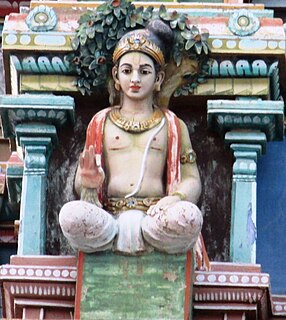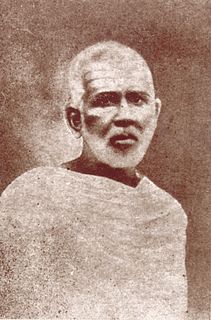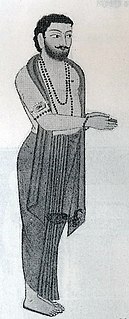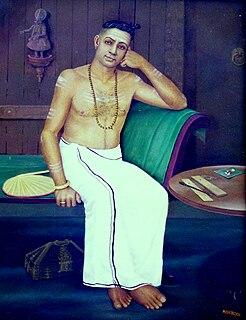 W
WBhanubhakta Acharya was a Nepali poet, translator and writer. He was the first writer to translate the great epic Ramayana from Sanskrit to Nepali. Despite having other contemporary poets in the country during his time, he is revered and honoured with the title of Aadikavi of the Nepali language. His poems were later published by famous poet Motiram Bhatta.
 W
WManmohan Acharya is a poet and lyricist from India. His Sanskrit poems and lyrics have been put to music and danced to in the Odissi classical Indian dance form. A devotional song from his Gitamohanam is featured in the 2009 Bollywood movie, The Desire. He is also a researcher and published author.
 W
WAchyutananda Das (Odia:-ଅଚ୍ୟୁତାନନ୍ଦ ଦାସ ) or Mahapurusha Achyutananda was a 16th-century poet seer and Vaishnava saint from Odisha, India. He was considered to have the power to see the past, present and future. He was a prolific author, and one of the group of five, that led a revolution in spirituality in Odisha by translating Sanskrit texts into the Odia language for common people.
 W
WMogeri Gopalakrishna Adiga (1918–1992) was a modern Kannada poet. He is known by some commentators as the "pioneer of New style" poetry.
 W
WTallapaka Annamacharya was a 15th-century Hindu saint and the earliest known Indian musician to compose songs called sankirtanas in praise of the Lord Venkateswara, a form of Vishnu. He is the first known composer in carnatic music. The most famous composers of Carnatic music like Purandara Dasa, Kanaka Dasa also came after him. The musical form of the keertana songs that he composed, which are still popular among Carnatic music concert artists, have strongly influenced the structure of Carnatic music compositions. Annamacharya is remembered for his saintly life, and is honoured as a great devotee of Vishnu by devotees and saintly singers.
 W
WGurajada Venkata Apparao was a noted Indian playwright, dramatist, poet, and writer known for his works in Telugu theatre. Rao wrote the play Kanyasulkam in 1892, which is often considered the greatest play in the Telugu language. One of the pioneers of Indian theatre, Rao holds the titles Kavisekhara and Abyudaya Kavitha Pithamahudu. In 1910, Rao scripted the widely known Telugu patriotic song "Desamunu Preminchumanna".
 W
WArunagirinaadhar was a Tamil saint-poet who lived during the 15th century in Tamil Nadu, India. He was the creator of Thiruppugazh, a book of poems in Tamil in praise of lord Murugan.
 W
WAvvaiyar was the title of more than one female poet who were active during different periods of Tamil literature. They were some of the most famous and important female poets of the Tamil canon.
 W
WMamata Banerjee is an Indian politician who is serving as the 8th and current Chief Minister of West Bengal since 2011 being the first woman to hold the office. She founded the party All India Trinamool Congress in 1998 after separating from the Indian National Congress, and became its chairperson. She is often referred to as Didi.
 W
WChand Bardai was an Indian poet, who composed Prithviraj Raso, an epic poem in Brajbhasa about the life of the Chahamana king Prithviraj Chauhan. The poem presents him as a court poet of Prithviraj. According to it, after Prithviraj was defeated at the Second battle of Tarain and taken to Ghazna by Muhammad of Ghor, Chand Bardai travelled to Ghazna and helped Prithviraj kill Muhammad.
 W
WBhoja Bhagat (1785–1850), also known as Bhojal or Bhojalram was a Hindu saint poet from Gujarat, India.
 W
WDhanna Bhagat was a mystic poet and a Vaishnav devotee whose three hymns are present in Adi Granth. His life story also included in Bhaktamal
 W
WSubramania Bharathi, was a Tamil writer, poet, journalist, Indian independence activist, social reformer and polyglot. Popularly known as "Mahakavi Bharathi", he was a pioneer of modern Tamil poetry and is considered one of the greatest Tamil literary figures of all time. His numerous works included fiery songs kindling patriotism during the Indian Independence movement.
 W
WBhima Bhoi (1850–1895) was a saint, poet and philosopher from the state of Odisha in India. Bhima Bhoi was a bhakta of Mahima Swamy. From Mahima Swamy, Bhima Bhoi would receive initiation into Mahima Dharma, an Indian religious tradition that challenged the authority of caste Hinduism on its own terms.
 W
WPurandara Dāsa was an Indian philosopher, a Haridasa, a renowned composer of Carnatic music, a great devotee of Lord Krishna, a Vaishnava poet, a saint and a social reformer. He was a disciple of the Dvaita philosopher-saint Vyasatirtha, and a contemporary of yet another Haridasa, Kanakadasa. His guru, Vyasatirtha, glorified Purandara Dasa in a song thus: Dāsarendare purandara dāsarayya. He was a composer, singer and one of the chief founding-proponents of South Indian classical music. In honor of his significant contributions to Carnatic music, he is widely referred to as the Pitamaha of Carnatic music. He is respected as an Avatara (incarnation) of the great sage Narada.
 W
WDevaraya Swamigal was a Tamil devotee of Lord Muruga. He is best known for his composition of the Tamil hymn Kanda Shasti Kavasam.
 W
WMehr Lal Soni, better known as Zia Fatehabadi, was an Indian Urdu ghazal and nazm writer. He was a disciple (shaagird) of Syed Aashiq Hussain Siddiqui Seemab Akbarabadi (1882–1951), who was a disciple of Nawab Mirza Khan Daagh Dehlvi (1831-1905). He used the takhallus of Zia meaning "Light" on the suggestion of his teacher, Ghulaam Qadir Farkh Amritsari.
 W
WKhushtar Girami (1902–1986) born Ram Rakha Mal Chadda, was a renowned Urdu writer and poet. He is more remembered as the editor of the then India’s leading Urdu Monthly Biswin Sadi which he also owned. He started publication of this magazine from Lahore in 1937, and later shifted to Delhi. He is credited with having introduced numerous budding Urdu and Hindi poets, short-story writers, novelists, essayists and literary critics. All renowned Urdu poets and writers were proud regular contributors to Biswin Sadi. His service to Urdu language is unforgettable. In 1977 he sold this magazine to Rehman Nayyar, the erstwhile owner and editor of Ruby, to lead a retired life. His book titled Sihat aur Zindagi published by Book Home in 1980, is a popular book on this subject.
 W
WRaghupati Sahay, better known under his pen name Firaq Gorakhpuri, was a writer, critic, and, according to one commentator, one of the most noted contemporary Urdu poets from India. He established himself among peers including Muhammad Iqbal, Yagana Changezi, Jigar Moradabadi and Josh Malihabadi.
 W
WSatsvarupa das Goswami is a senior disciple of Bhaktivedanta Swami, who founded the International Society for Krishna Consciousness (ISKCON), better known in the West as the Hare Krishna movement. Serving as a writer, poet, and artist, Satsvarupa dasa Goswami is the author of Bhaktivedanta Swami's authorized biography,Srila Prabhupada-lilamrta. After His Divine Grace A. C. Bhaktivedanta Swami Prabhupada's death, Satsvarupa dasa Goswami was one of the eleven disciples selected to become a priest to initiate future disciples on His Divine Grace’s behalf in ISKCON through proxy, although this order was later abandoned with no justification. Satsvarupa dasa Goswami,, is one of the first few Westerners ordained by Bhaktivedanta Swami in September 1966. He has been since established as a prolific Vaishnava writer and poet. While traveling, lecturing on Krishna consciousness, and instructing disciples worldwide, he published over hundred books including poems, memoirs, essays, novels, and studies based on the Vaishnava scriptures. In his later years he created hundreds of paintings, drawings, and sculptures that attempt to capture and express his perspective on the culture of Krishna consciousness.
 W
WIshwar Chandra Gupta was a famous Indian Bengali poet and writer. Gupta was born in Kanchrapara, North 24 Parganas, West Bengal, India.
 W
WJagadish Gupta was an Indian poet, novelist and short story writer. Known for his realistic view of life, strange character portrayal and unique narrative style, he was one of the major exponents of modern Bengali literature.
 W
WMaha Vidhwan Rao Sahib Mu Raghava Iyengar (1878–1960) was a well known Tamil scholar and researcher of Tamil literature.
 W
WThe Bhasha Kavisekhara Mahavidwan R. Raghava Iyengar (1870–1946) was known for critical scholarship and creative interpretation of literature.
 W
WMaha vidhwan Thirumaaligai Appan Narayana Iyengar was born to Thirumaaligai Appan Iyengar and Shenkamalavalli Ammal on 31 Oct 1861 in EthirkOtai near Srivilliputhur. After having learnt the basics of Tamil literature and grammar from his father Appan Iyengar and other scholars near his home town during his formative years, he moved to Ramanathapuram.
 W
WUlloor S. Parameswara Iyer, born Sambasivan but popularly known as Ulloor, was an Indian poet of Malayalam literature and a historian. He was one of the modern triumvirate poets of Kerala in the first half of the 20th century, along with Kumaran Asan and Vallathol Narayana Menon. Umakeralam, a mahakavya, and Kerala Sahitya Charithram, a comprehensive history of Malayalam language, are most two of his works.
 W
WJayadeva, also known as Jaidev, was a Sanskrit poet during the 12th century. He is most known for his epic poem Gita Govinda which concentrates on Krishna's love with the gopi, Radha in a rite of spring. This poem, which presents the view that Radha is greater than Krishna, is considered an important text in the Bhakti movement of Hinduism.
 W
WKālidāsa was a Classical Sanskrit author and is often considered ancient India's greatest playwright and dramatist. His plays and poetry are primarily based on the Vedas, the Ramayana, the Mahabharata and the Puranas. His surviving works consist of three plays, two epic poems and two shorter poems.
 W
WKambar was a medieval Tamil Hindu poet and the author of the Ramavataram, popularly known as Kambaramayanam, Tamil version of the epic Ramayana. Kambar also authored other literary works in Tamil, such as Thirukkai Vazhakkam, Erezhupathu, Silaiyezhupathu, Kangai Puranam, Sadagopar Anthathi and Saraswati Anthathi.
 W
WKannadasan was an Indian philosopher, poet, film song lyricist, producer, actor, script-writer, editor, philanthropist, and is heralded as one of the greatest and most important lyricists in India. Frequently called Kaviarasu, Kannadasan was most familiar for his song lyrics in Tamil films and contributed around 5000 film lyrics apart from 6000 poems and 232 books, including novels, epics, plays, essays, his most popular being the 10-part religious book on Hinduism, Arthamulla Indhu Matham. He won the Sahitya Akademi Award for his novel Cheraman Kathali in the year 1980 and was the first to receive the National Film Award for Best Lyrics, given in 1969 for the film Kuzhanthaikkaga.
 W
WGajānan Digambar Mādguḷkar was a Marāthi poet, lyricist, writer and actor from India. He is popularly known in his home state of Mahārāshtra by just his initials as Ga Di Mā (गदिमा). He was awarded Sangeet Natak Akademi Award in 1951 and Padma Shri in 1969. He has written 157 screen plays and over 2000 songs in his career. He was called Ādhunik Valmiki of current era due to his composition of Geet Rāmāyan as the most notable work. 2019 is celebrated as his Birth Century year. Government of Maharashtra hosts various events and festivals to grace the occasion.
 W
WMagha was a Sanskrit poet at King Varmalata's court at Shrimala, the then-capital of Gujarat. Magha was born in a Shrimali Brahmin family. He was son of Dattaka Sarvacharya and grandson of Suprabhadeva. His epic poem (mahākāvya) Shishupala Vadha, in 20 sargas (cantos), is based on the Mahabharata episode where the defiant king Shishupala is beheaded by Krishna's chakra (disc). He is thought to have been inspired by, and is often compared with, Bharavi.
 W
WTilok Chand Mehroom was an Indian Urdu poet who was admired not only for his writings but also for his simple lifestyle and evident deep dislike of religious discrimination.
 W
WNammalvar is one of the twelve alvar saints of Tamil Nadu, India, who are known for their affiliation to the Vaishnava tradition of Hinduism. The verses of alvars are compiled as Nalayira Divya Prabandham and the 108 temples are classified as Divya Desam. Nammalvar is considered the fifth in the line of the twelve alvars. He is highly regarded as a great mystic of the Vaishnava tradition. He is also considered the greatest among the twelve alvars and his contributions amount to 1352 among the 4000 stanzas in the Nalayira Divya Prabandam.
 W
WMurari Lal Sharma is an Indian author and poet.
 W
WMahakavi Krittibas Ojha Bengali pronunciation: [ˈkrit̪ːiˌbaˑs ojʰa] (1381–1461) was a medieval Bengali poet. His major contribution to Bengali literature and culture was Indian epic Rāmāyaṇa in Bengali. His work, the Śrīrām Pā̃cālī, is popularly known as the Krittivasi Ramayan. His work, edited by Jaygopal Tarkalamkar, was published by the Serampore Mission Press.
 W
WParamananda (1884–1940) was a swami and one of the early Indian teachers who went to the United States to spread the Vedanta philosophy and religion there. He was a mystic, a poet and an innovator in spiritual community living.
 W
WRishi Patialvi, (1917–1999), born Bam Dev Sharma, hailing from Hoshiarpur District (Punjab), was a popular Urdu poet belonging to Daagh Dehlvi’s lineage. He was a disciple of Naseem Noormahali who was a disciple of Labhu Ram Josh Malsiyani (1883-1976), a disciple of Mirza Khan Daagh Dehlvi. He died of a massive heart-attack on 26 December 1999 at Mumbai aged 82 years.
 W
WPoonthanam Nambudiri (1547–1640AD) was a famous poet and a devotee of Guruvayurappan, who lived in Keezhattoor in what is now Malappuram district, Kerala, India. He is remembered for his masterpiece, Jnanappana which means "the song of divine wisdom" in Malayalam. His other chief poems in Malayalam are Bhasha Karnamritam and Kumaraharanam or Santanagopalam Pana. His other works include Raghaviyam, Vishnuvilasam and Sitaraghavam in Sanskrit and Vishnugeeta and Panchatantram in modern Malayalam.
 W
WBammera Pothana (1450–1510) was an Indian Telugu poet best known for his translation of the Bhagavata Purana from Sanskrit to Telugu. He was a Telugu and Sanskrit Scholar. His work, Andhra Maha Bhagavatamu, is popularly called as Pothana Bhagavatam in Telugu.
 W
WChunnakam Kumaraswamy Pulavar was a well-known Sri Lankan Tamil scholar and poet from Maylani village in Chunnakam township in Jaffna peninsula in the British held Ceylon now known as Sri Lanka. He lived from 1854 to 1922. He along with other activists were instrumental in the revival of native traditions in Sri Lanka that had been long dormant during the previous 400 years of colonial rule by various European powers.
 W
WDwijendralal Ray, also known as D. L. Ray, was a Bengali poet, playwright, and musician. He was known for his Hindu mythological and Nationalist historical plays and songs known as Dwijendrageeti or the Songs of Dwijendralal, which number over 500, create a separate subgenre of Bengali music.
 W
WSadhak Rāmprasād Sen was a Hindu Shakta poet and saint of eighteenth century Bengal. His bhakti poems, known as Ramprasadi, are still popular in Bengal—they are usually addressed to the Hindu goddess Kali and written in Bengali. Stories of Ramprasad's life typically include legends and myths mixed with biographical details.
 W
WSatya Vrat Shastri is a highly decorated Sanskrit scholar, writer, grammarian and poet from India. He has written three Mahakavyas, three Khandakavyas, one Prabandhakavyas and one Patrakavya and five works in critical writing in Sanskrit. His important works are Ramakirtimahakavyam, Brahattaram Bharatam, Sribodhisattvacharitam, Vaidika Vyakarana, Sarmanyadesah Sutram Vibhati, and "Discovery of Sanskrit Treasures" in seven volumes.
 W
WSheikh Muhammad (1560–1650), also known as Shekh Mahammad (Mohammad), Sayyad Shaikh Mahammad Qadiri, Shaikh Muhammad Shrigondekar, and Sheikh (Shekh) Mahammad-baba, was a Muslim saint-poet who is venerated by Hindus. He is considered the most well-known Marathi Muslim poet. He is the author of the Yoga-samgrama (Yoga-sangrama).
 W
WSurdas was a 16th-century blind Hindu devotional poet and singer, who was known for his lyrics written in praise of Krishna. They are usually written in Braj Bhasha, one of the two literary dialects of Hindi.
 W
WTulsidas, also known as Goswami Tulsidas, was a Ramanandi Vaishnava saint and poet, renowned for his devotion to the deity Rama. He wrote several popular works in Sanskrit and Awadhi, but is best known as the author of the epic Ramcharitmanas, a retelling of the Sanskrit Ramayana based on Rama's life in the vernacular Awadhi.
 W
WValmiki is celebrated as the harbinger-poet in Sanskrit literature. The epic Ramayana, dated variously from the 5th century BCE to first century BCE, is attributed to him, based on the attribution in the text itself. He is revered as Ādi Kavi, the first poet, author of Ramayana, the first epic poem.
 W
WUnnayi Warrier was a poet, writer, scholar, dramatist who lived in Kerala, India during the later part of the 18th century. He is best known for his chef-d'oeuvre Nalacharitham aattakatha and is known to have made significant contributions to the art of Kathakali, the classical dance-drama form of Kerala.
 W
WSachchidananda Hirananda Vatsyayan, popularly known by his nom de plume Agyeya, was an Indian writer, poet, novelist, literary critic, journalist, translator and revolutionary in Hindi language. He pioneered modern trends in Hindi poetry, as well as in fiction, criticism and journalism. He is regarded as the pioneer of the Prayogavaad (experimentalism) movements in modern Hindi literature.
 W
WVidyapati, also known by the sobriquet Maithil Kavi Kokil, was a Maithili and Sanskrit poet, writer and polyglot.
 W
WKrishna Dvaipāyana, also known as Vyasa and Veda Vyāsa, is the traditional author of the Mahabharata, and Puranas, as well as the traditional compiler of the Vedas, some of the most important works in the Hindu tradition. The name Krishna Dvaipayana refers to his complexion and birth place.